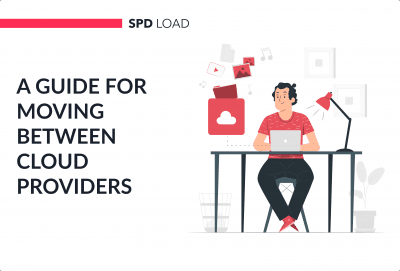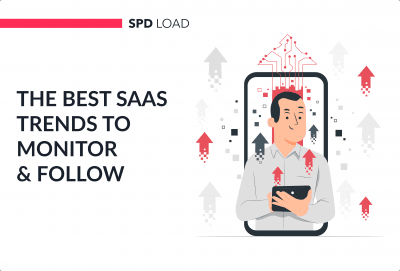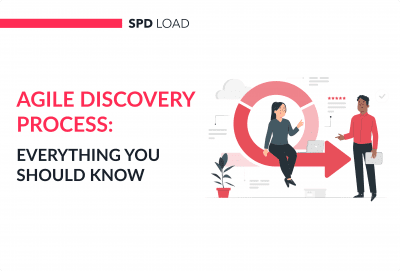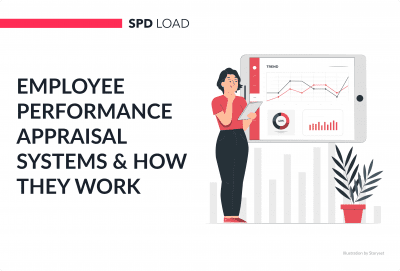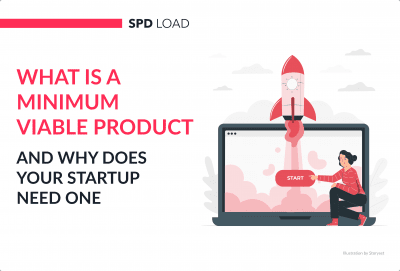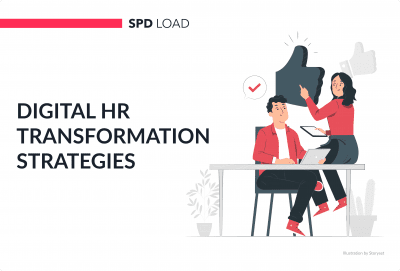Hospital Management System Features for Improved Healthcare
- Updated: Apr 05, 2025
- 8 min
With technological advancements and new tools that simplify our lives, wasting time on repetitive tasks seems like a story from the last century.
However, there are still many organizations where people spend hours on activities that can be easily automated with software without compromising on quality.
According to the Allocation of Physician Time in Ambulatory Practice survey, healthcare providers spend 35% of their time on documenting patient data.
While paperwork is unavoidable in a hospital, you can automate the process and reduce the burden on the authorized personnel.
As a company specializing in healthcare app development services, we want to share some of the insights about this topic.
Let’s explore the market size of HMS software, its capabilities, benefits, and key modules.
Let's shape your startup's product vision together!
What is a Hospital Management System?
A hospital management system (HMS) is a tool used by healthcare organizations to optimize and streamline operations across multiple hospital departments.
This software solution helps to manage various aspects of healthcare delivery, such as administrative, medical, financial, and legal processes.
In 2023, the world HMS market was valued at $5.46 billion.
It is forecasted to reach $20.11 billion by 2032 with a CAGR of 17.7%.
Some of the main growth driving factors include the rising need for operational efficiency, regulatory compliance, and seamless technology integration. Here is more about effective EHR integration strategies.
According to Statista, over 50% of healthcare companies aim to improve efficiency through software modernization since modern systems better adapt to ever-changing regulatory landscapes.
This helps organizations avoid penalties and maintain compliance.
While the upfront investment may seem significant, it leads to long-term cost savings as maintenance expenses become lower and overall operational efficiency improves. 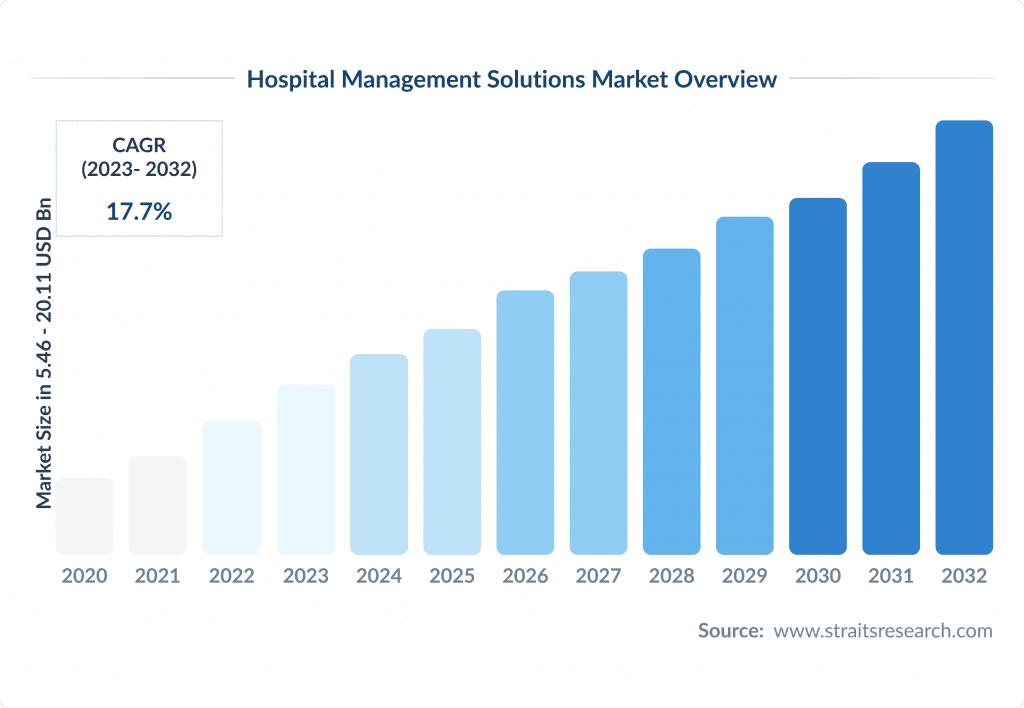
Core Capabilities of Hospital Management Software
With digital healthcare solutions, hospitals can simplify numerous tasks, such as:
- Patient check-ins
- Lab report delivery
- Medication tracking
- Appointment management
- Staff scheduling
- Medical billing and insurance processing
- Inventory monitoring
- Electronic prescription handling
- Patient discharge coordination
- Telemedicine consultations
- Follow-up reminders
- Data sharing between departments
- Compliance tracking
- Operational reporting
- Shift planning for staff
These are routine tasks that can take up a lot of time. Hospital systems can automate these tasks to save precious time on more important activities.
As AI advances, so does its potential in medicine. Learn how AI and healthcare are shaping the future. 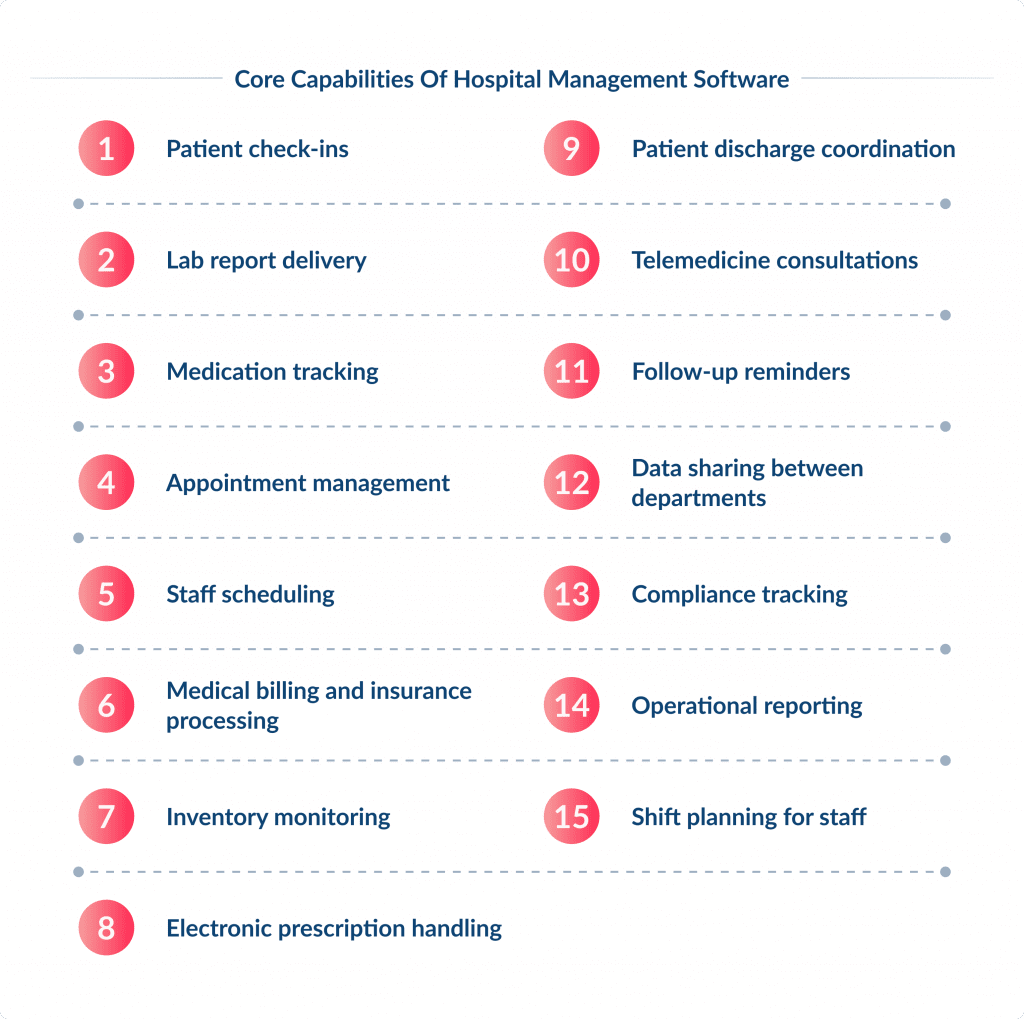
So, what are the key modules of hospital management software?
Let’s discover.
Key Modules of a Hospital Management System
A Hospital Management System (HMS) consists of several critical modules that are designed to streamline healthcare operations and improve patient care.
The main components include:
1. Patient Management
This module centralizes patient profiles, medical histories, and personal information to enhance care coordination.
It automatically captures and stores patient information, such as medical history, treatment required, and insurance details.
It also generates unique admissions numbers for each patient and builds a comprehensive discharge summary.
This eliminates the need for repetitive data collection and enables doctors to focus on treatment.
2. Appointment Management
Appointment management automates scheduling processes and allows patients to book, modify, or cancel appointments online.
This module helps reduce wait times and optimize resource allocation.
3. Staff Management
The staff management or human resource management system module manages staff information, including qualifications and roles, work schedules, payroll processing, performance tracking, and more.
It encourages the careful use of the available personnel and the compliance of labor laws.
4. Financial Management
The financial management module monitors and manages hospital finances.
This includes:
- Billing and invoicing
- Insurance claims processing
- Financial reporting and analytics
Tagging each service and treatment with its cost helps hospitals track how much a patient’s care is actually costing.
This is often based on last year’s expenses to understand where money was spent most.
5. Pharmacy Management
The pharmacy management module helps to manage the entire scope of pharmacy operations.
These are managing inventory, maintaining vendor details, dispensing accurate medications, and precise advising to patients.
Also, it simplifies adherence to pharmaceutical guidelines.
Additionally, it effectively monitors pharma staff activities, maintains medication quality, and helps incorporate advanced pharmaceutical technology.
6. Electronic Health Records (EHR)
The EHR module is pretty much like EMR, but the range of data they can record goes beyond just medical records.
Electronic health records also cover patient demographics, progress notes, medications, vital signs, past medical history, and many more.
EHRs are created to be shared not only within the same healthcare setting but also across different settings.
This provides a comprehensive view of the patient’s health information.
Learn more about how to build an EHR software.
7. Lab Management
The lab management module helps to manage various laboratory operations, including sample collection, test ordering, processing, and reporting results.
The system carries all the details of the test services that are available in hospitals (CBC test, X-ray, blood test, etc) and manages the patient’s test history.
It connects with laboratory equipment, automates workflow, and enhances the efficacy of laboratory processes.
8. Compliance Management
Every healthcare software solution must comply with strict industry regulations.
The most important one is HIPAA compliance (feel free to learn more about HIPAA compliant app development)
Strict regulatory requirements, such as HIPAA and GDPR, mandate the protection of patient data and impose penalties for non-compliance.
To ensure full compliance, regular security audits and risk assessments are conducted to identify and address any vulnerabilities in the system. With the increasing use of connected healthcare devices, implementing medical device cybersecurity measures is essential to safeguard patient data.
9. Analytics and Reporting
Analytics and reporting modules provide instant access to critical information, enabling healthcare providers to make informed decisions quickly.
Another significant feature is real-time reporting.
This allows for the immediate generation and distribution of reports based on current data. It helps hospitals respond swiftly to changing situations or emerging IT trends.
Predictive analytics is another valuable tool that can be integrated into your hospital management system through custom development.
Predictive analytics uses historical data and machine learning algorithms to forecast future outcomes or trends, which could include patient health risks or operational efficiency issues.
10. Claims Management
Claims management modules are an essential part of healthcare management systems.
They help healthcare providers and insurers handle insurance claims in one centralized system. It can reduce costs and improve the experience for everyone: patients, insurers, and partners.
Claims management systems rely on healthcare data analytics to make the process more efficient and accurate.
Analyzing past claims and identifying patterns, these systems can check for errors in coding, predict whether a claim will be approved or denied, and highlight areas where delays might happen.
This helps healthcare providers streamline the entire process, reduce mistakes, and address any recurring issues that could lead to rejected claims.
Overall, claims management modules simplify a complex process and make it easier for everyone involved.
11. Patient Support
Patient satisfaction is a top priority for any hospital.
It builds trust and improves the quality of care.
This support management module collects and addresses patient feedback, complaints, or requests quickly to ensure a positive experience.
Here’s how it works: after a patient is discharged, they might receive an automated text or email with a link to share their thoughts.
They can easily rate their experience, report any issues, or suggest improvements.
The system records this feedback so staff can review it and take action where needed.
Patient feedback and complaints are often neglected simply because the hospital staff doesn’t have enough time to process the information and react swiftly.
Automating this process not only saves time for the team but also is a way to show that every patient has a voice and is not ignored.
Module | Primary Function | Key Capabilities |
|---|---|---|
Patient Management | Track patient journeys | Registration, medical history, treatment tracking |
Appointment Scheduling | Schedule and coordinate | Online booking, resource allocation |
Staff Management | Handle human resources | Payroll, scheduling, role management |
Facility Management | Control medical supplies | Stock tracking, automated reordering |
Billing | Financial processing | Insurance claims, invoicing, payment tracking |
Electronic Health Records (EHR) | Centralize patient data | Real-time access, medical records sharing, interoperability |
Pharmacy Management | Manage medications | Prescription tracking, stock control, alerts for low inventory |
Lab Management | Streamline lab operations | Test scheduling, result updates, integration with patient records |
Compliance Management | Ensure regulatory adherence | HIPAA, GDPR compliance tracking, audit logs, data security checks |
Analytics and Reporting | Provide actionable insights | Operational metrics, financial reports, patient outcomes analysis |
Patient Feedback | Enhance patient interaction | Feedback forms, appointment reminders, health education resources |
How Hospital Management Systems Improve Hospital Workflows
As we have explored some of the most essential modules of hospital management systems, let’s elaborate more on the potential benefits of this software for healthcare providers.
We will focus on three main benefits: better patient experience, improved medical information management, and reduced costs.
Enhanced Patient Experience
Hospital management systems are designed to make life easier for both patients and healthcare providers.
Here is what it looks like:
A patient books an appointment online without having to wait on hold: just a few clicks, and it’s done.
Then, they get a reminder sent straight to their phone. No need to worry about forgetting it.
When they arrive at the hospital, everything is set up to minimize waiting times.
The system helps staff coordinate schedules so that the right doctor or room is ready for the patient.
Behind the scenes, it keeps all departments connected, so if their lab results or medical records are needed, they’re available instantly.
In the end, it creates a smoother, less stressful experience while helping hospitals stay organized and efficient.
Improved Medical Information Management
Improved medical information management in a hospital management system makes healthcare much smoother and safer.
Instead of digging through piles of paper records or searching for files across different systems, everything a doctor or nurse needs is stored in one secure, easy-to-access digital system.
So, if a patient is suddenly admitted to the hospital, the staff can instantly pull up their medical history and know exactly what treatments or medications they’ve had before. This helps them make quicker, more informed decisions.
Plus, because everything is digital, there’s less room for errors, and it’s easier to keep everything up to date.
On top of that, the system makes sure all this sensitive data is protected, keeping patient privacy intact while still making the whole process faster and more efficient for everyone involved.
Reduced Costs and Workload
A hospital management system reduces both costs and staff workload.
For instance, instead of spending time manually entering patient information or booking appointments, the system automates those tasks.
This means staff can focus on more important things, like answering patient questions or providing care.
The system also helps cut costs by eliminating the need for paper records and reducing errors.
When everything is stored digitally, there’s less chance of costly mistakes. For example, billing errors can be spotted quickly before they become a bigger issue.
Overall, a hospital management system makes hospitals more efficient, lowers costs, and eases the workload on staff, leading to better care for patients.
The return on investment of an HMS isn’t always immediate. This is about long-term improvements and savings.
Our ROI Calculator can help you estimate the potential savings and benefits of implementing an HMS.
You just need to enter a few key metrics to see how much your hospital could save on administrative costs, reduce errors, and increase operational efficiency. 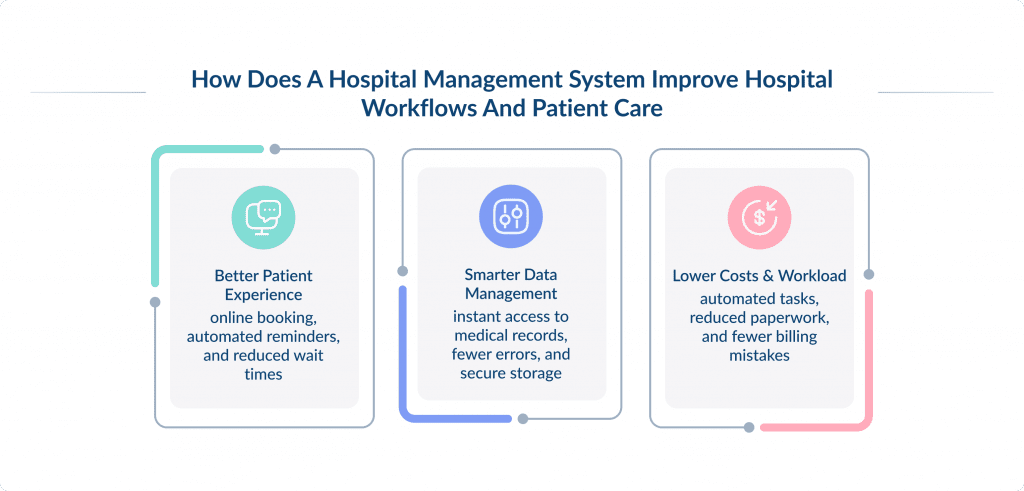
How to Develop a Hospital Management Software?
Want to create hospital management software?
Then, you need to start with market research and competitor analysis.
The gathered insights will help you map out the features that meet the industry’s expectations.
However, doing this on your own can take months and postpone the release of your solution.
If you are short on time, it is better to dedicate the research and development tasks to a reliable healthcare digital transformation consulting and development company.
At SpdLoad, we take a systematic and collaborative approach to developing hospital management systems.
We work closely with clients to understand their needs and objectives.
It helps us identify key requirements and potential challenges and, based on this information, develop tailored healthcare software that meets your unique business needs.
With more than ten years of expertise in custom healthcare software development, Spdload helps medical businesses and healthcare professionals address their current challenges and reach the market with custom solutions.
Let’s get in touch and discuss how our expertise can help you bring your ideas from concept to launch.



